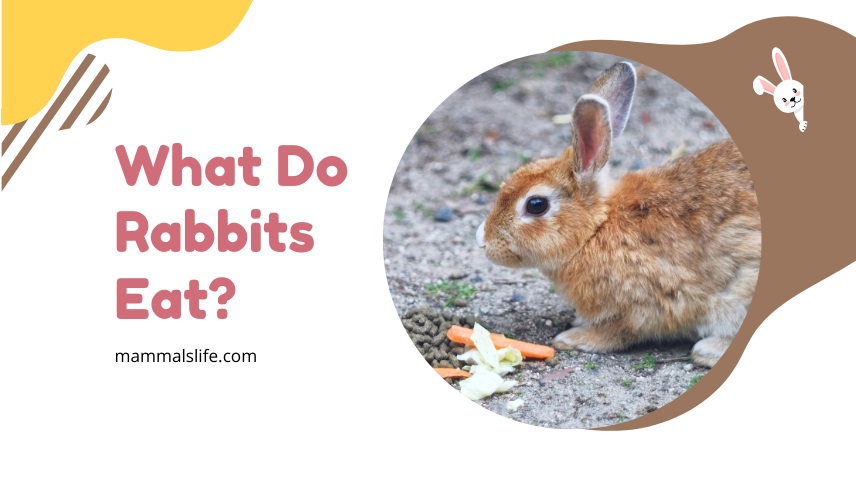Last Updated on February 22, 2025 by Mammals Life
Rabbits primarily eat hay, fresh vegetables, and a small amount of pellets. They also enjoy fresh water daily.
Rabbits have a delicate digestive system requiring a balanced diet for optimal health. Hay should be the staple, making up the majority of their diet. It aids in digestion and keeps their teeth healthy. Fresh vegetables like leafy greens provide essential nutrients and variety.
Pellets should be given in moderation to avoid obesity. Fresh water must always be available to keep rabbits hydrated. Understanding the dietary needs of rabbits ensures they live a healthy and happy life. Proper nutrition is crucial, as it affects their overall well-being and longevity.
Natural Diet In The Wild
Rabbits thrive on a diet that mimics their natural habitat. In the wild, they consume a variety of plants. Their diet is rich in fiber and low in fat. Understanding their natural diet helps in providing the best care.
Grasses And Hay
Grasses form the bulk of a wild rabbit’s diet. They graze on various types of grass. This provides them with essential nutrients. Hay is dried grass and is equally important. Both are rich in fiber which aids digestion. Wild rabbits chew on these for most of their day.
Here are some common grasses and hay types:
- Timothy Grass
- Orchard Grass
- Meadow Hay
- Oat Hay
These varieties offer a balanced diet. They keep the rabbit’s digestive system healthy. Always ensure fresh grass or hay is available.
Leafy Greens
Leafy greens are another important part of their diet. Rabbits eat a variety of greens in the wild. These provide vitamins and minerals. They also add moisture to the diet.
Common leafy greens include:
- Dandelion Greens
- Clover
- Plantain Leaves
- Chickweed
These greens are safe and nutritious. They should be given in moderation to prevent health issues. Always ensure the greens are fresh and clean.
In summary, grasses, hay, and leafy greens make up a wild rabbit’s diet. Providing these ensures they receive the right nutrients.
Domestic Rabbit Diet
Understanding what domestic rabbits eat is key to their health. A balanced diet keeps them happy and active. Below, we explore the main food types for domestic rabbits.
Commercial Pellets
Commercial pellets are often the base of a rabbit’s diet. These pellets are packed with essential nutrients. They are easy to find in pet stores.
Look for pellets with high fiber content. Fiber helps with digestion and keeps their teeth healthy. Avoid pellets with added sugars or artificial colors.
| Nutrient | Recommended Percentage |
|---|---|
| Fiber | 18-25% |
| Protein | 12-14% |
| Fat | 2-3% |
Fresh Vegetables
Fresh vegetables are a vital part of a rabbit’s diet. They provide vitamins, minerals, and hydration.
Introduce new vegetables slowly to avoid stomach upset. Wash vegetables thoroughly to remove pesticides and dirt.
- Leafy Greens: Romaine lettuce, kale, parsley.
- Non-Leafy Vegetables: Carrots, bell peppers, broccoli.
Avoid vegetables high in starch or sugar. Examples include potatoes and corn. These can cause digestive issues.
Feed a variety of vegetables daily. This ensures a wide range of nutrients.
Safe And Unsafe Foods
Rabbits have sensitive digestive systems. Knowing what they can and can’t eat is crucial. Offering the right foods ensures their health and happiness. Let’s explore the safe and unsafe options for your furry friend.
Toxic Foods
Some foods are dangerous for rabbits. These can harm their health or even be fatal. Always avoid the following:
- Chocolate – Contains theobromine, which is toxic to rabbits.
- Avocado – Contains persin, a fungicidal toxin harmful to rabbits.
- Onions and Garlic – Cause hemolytic anemia in rabbits.
- Rhubarb – Contains oxalic acid, which is toxic.
- Iceberg Lettuce – Contains lactucarium, which can be harmful.
Healthy Treats
Healthy treats can be given in moderation. These foods are safe and nutritious for rabbits:
- Carrots – Rich in vitamins but should be given sparingly.
- Bell Peppers – Provide a good source of Vitamin C.
- Broccoli – High in fiber and beneficial nutrients.
- Apples – Remove seeds and give in small amounts.
- Blueberries – Antioxidant-rich and a tasty treat.
Nutritional Needs
Rabbits have specific nutritional needs to stay healthy. Their diet must be balanced and rich in essential nutrients. Understanding these needs helps ensure your rabbit lives a long, happy life.
Vitamins And Minerals
Rabbits require a variety of vitamins and minerals for optimal health. These include Vitamin A, Vitamin D, and calcium.
Vitamin A is crucial for vision, growth, and immune function. Carrots and leafy greens are excellent sources.
Vitamin D helps in calcium absorption. Rabbits get this vitamin from sunlight and hay.
Calcium is necessary for strong bones and teeth. Too much calcium, though, can cause kidney problems. Offer limited amounts of calcium-rich foods like kale and parsley.
Hydration
Hydration is vital for a rabbit’s health. Always provide fresh water.
Rabbits can drink from a bowl or a water bottle. Clean these regularly to prevent bacteria growth.
Fresh vegetables also contribute to hydration. Offer vegetables like cucumber and lettuce to keep your rabbit well-hydrated.
| Nutrient | Source |
|---|---|
| Vitamin A | Carrots, Leafy Greens |
| Vitamin D | Sunlight, Hay |
| Calcium | Kale, Parsley |
Feeding Tips And Guidelines
Ensuring your rabbit gets the right diet is crucial for their health. Proper feeding habits can prevent many health issues and keep your bunny happy. Let’s explore some essential feeding tips and guidelines for your furry friend.
Portion Control
Controlling portions is key to maintaining your rabbit’s health. Overfeeding can lead to obesity and other health problems. Here’s a simple guide to portion control:
| Food Type | Daily Portion |
|---|---|
| Hay | Unlimited |
| Fresh Vegetables | 1 cup per 2 lbs of body weight |
| Pellets | 1/4 cup per 5 lbs of body weight |
| Fruits | 1-2 tbsp per day |
Always adjust portions based on your rabbit’s weight and activity level. Smaller rabbits need less food than larger ones. Monitor your rabbit’s body condition regularly. Adjust their diet as needed.
Feeding Schedule
Establishing a consistent feeding schedule helps regulate your rabbit’s digestion. Rabbits thrive on routine. Here’s a typical feeding schedule:
- Morning: Fresh hay and a small portion of pellets
- Afternoon: Fresh vegetables and a bit of hay
- Evening: More hay and the remaining pellets
Always ensure fresh water is available throughout the day. Clean the water bowl daily to prevent bacteria build-up. Consistency in feeding times can reduce stress for your rabbit.
Following these tips will help you maintain a balanced diet for your rabbit. A healthy rabbit is a happy rabbit!
Frequently Asked Questions
What Do You Feed Rabbits And Nutrition?
Feed rabbits hay, fresh vegetables, and high-quality pellets. Provide fresh water daily. Avoid sugary treats and processed foods.
What Are Rabbits Actual Favorite Food?
Rabbits love fresh hay, leafy greens, and vegetables like carrots and celery. They also enjoy fruits in moderation.
What Do Rabbits Eat And How Often?
Rabbits eat hay, fresh vegetables, and pellets. Offer hay daily, vegetables twice a day, and pellets in moderation.
What Is A Rabbit’s Diet In Nature?
Wild rabbits primarily eat grasses, herbs, and leafy weeds. They also consume bark, twigs, and buds during winter.
What Do Rabbits Eat Daily?
Rabbits eat hay, fresh vegetables, and pellets daily. Ensure they have constant access to fresh water.
Can Rabbits Eat Fruit?
Yes, rabbits can eat fruit in moderation. Apples, berries, and bananas are safe but limit sugary fruits.
Conclusion
Ensuring a balanced diet is crucial for your rabbit’s health. Fresh hay, vegetables, and clean water are essential. Avoid sugary treats and processed foods. Regularly consult your vet for diet advice. A proper diet keeps your rabbit happy and healthy, contributing to a long, joyful life.








